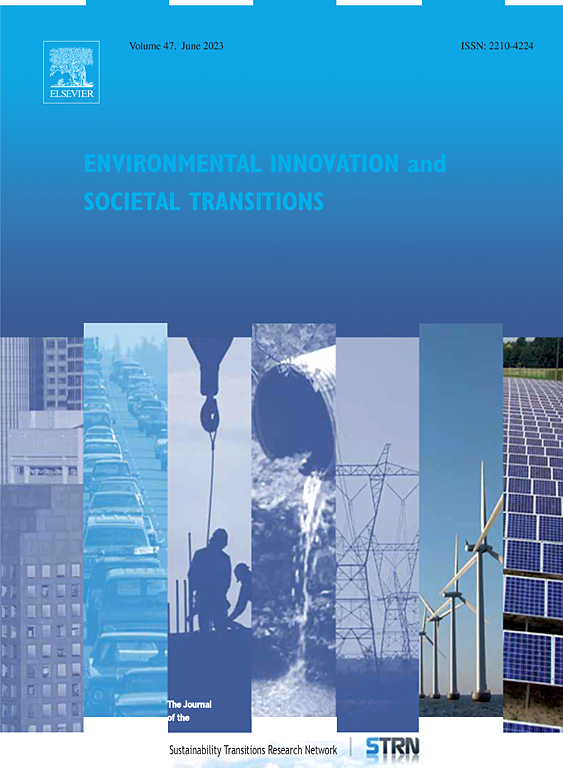Play, games, and gamification to support sustainability transitions: a scoping review and research agenda
IF 6.1
2区 经济学
Q1 ENVIRONMENTAL SCIENCES
Environmental Innovation and Societal Transitions
Pub Date : 2025-07-01
DOI:10.1016/j.eist.2025.101025
引用次数: 0
Abstract
Transitioning towards more sustainable systems is crucial in an era where carbon emissions continue to rise and planetary boundaries have been exceeded. However, traditional methods for public engagement with institutionally, technically, and ecologically complex issues have shown limited results in motivating change. In response, play, games, and gamification promise to support sustainability transitions by engaging diverse stakeholders and promoting psychological and behavioral changes. Despite these promises, we lack systematic knowledge of whether such techniques, which typically leverage individual motivation and agency, can bring together stakeholders in diverse areas. Thus, we conducted a scoping review of 86 empirical outputs, which revealed untapped potential to transform practices and support large-scale transitions. Based on our findings, we propose three future agendas. First, our contextual agenda encourages clearly anchored and critical sustainability conceptualizations, engaging practitioners for resilient transitions, considering emotions, supporting technical and ecological transitions, and expanding beyond the West and the local scale. Second, for design, we suggest user-centered approaches, customizable interventions, a broader conceptualization of play, combining game and goal types, including more immersive game elements and technologies, and leveraging tools and methods beyond gamification. Third, our empirical agenda calls for larger sample sizes and longer studies, contrasting conditions, employing mixed methods, exploring double and triple loop learning, displaying critical reflexivity, and reporting clearer causal links and experiences. Future research may utilize these points to explore and leverage the potential of playful and gameful interventions in changing transition dynamics, environments, and actors for practice and regime-level system transformations.
游戏、游戏和游戏化支持可持续性转型:范围审查和研究议程
在这个碳排放持续上升、地球边界已被超越的时代,向更可持续的系统过渡至关重要。然而,公众参与制度、技术和生态复杂问题的传统方法在推动变革方面显示出有限的结果。作为回应,玩耍、游戏和游戏化承诺通过吸引不同的利益相关者和促进心理和行为的改变来支持可持续发展的转变。尽管有这些承诺,但我们缺乏系统的知识,不知道这些通常利用个人动机和代理的技术是否能将不同领域的利益相关者聚集在一起。因此,我们对86个实证产出进行了范围审查,这些产出揭示了转变实践和支持大规模转型的未开发潜力。根据我们的研究结果,我们提出了三个未来议程。首先,我们的背景议程鼓励明确锚定和关键的可持续性概念,让从业者参与弹性转型,考虑情感,支持技术和生态转型,并扩展到西方和本地规模之外。其次,在设计方面,我们建议采用以用户为中心的方法,可定制的干预措施,更广泛的玩法概念化,结合游戏和目标类型,包括更具沉浸感的游戏元素和技术,并利用游戏化之外的工具和方法。第三,我们的实证议程要求更大的样本量和更长时间的研究,对比条件,采用混合方法,探索双环和三环学习,展示关键的反身性,并报告更清晰的因果关系和经验。未来的研究可能会利用这些观点来探索和利用游戏干预在改变过渡动态、环境和行为者的实践和制度层面的系统转变中的潜力。
本文章由计算机程序翻译,如有差异,请以英文原文为准。
求助全文
约1分钟内获得全文
求助全文
来源期刊

Environmental Innovation and Societal Transitions
Energy-Renewable Energy, Sustainability and the Environment
CiteScore
13.60
自引率
19.40%
发文量
90
审稿时长
56 days
期刊介绍:
Environmental Innovation and Societal Transitions serves as a platform for reporting studies on innovations and socio-economic transitions aimed at fostering an environmentally sustainable economy, thereby addressing structural resource scarcity and environmental challenges, particularly those associated with fossil energy use and climate change. The journal focuses on various forms of innovation, including technological, organizational, economic, institutional, and political, as well as economy-wide and sectoral changes in areas such as energy, transport, agriculture, and water management. It endeavors to tackle complex questions concerning social, economic, behavioral-psychological, and political barriers and opportunities, along with their intricate interactions. With a multidisciplinary approach and methodological openness, the journal welcomes contributions from a wide array of disciplines within the social, environmental, and innovation sciences.
 求助内容:
求助内容: 应助结果提醒方式:
应助结果提醒方式:


